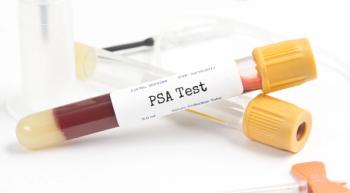
The FDA has granted a priority review designation to a biologics license application (BLA) for the investigational, humanized monoclonal antibody naxitamab (Danyelza) for the treatment of patients with relapsed/refractory high-risk neuroblastoma.

Kristi Rosa joined MJH Life Sciences in 2016 and has since held several positions within the company. Prior to working at the company, she served as lead copywriter and marketing coordinator at The Strand Theater. Email: krosa@onclive.com

The FDA has granted a priority review designation to a biologics license application (BLA) for the investigational, humanized monoclonal antibody naxitamab (Danyelza) for the treatment of patients with relapsed/refractory high-risk neuroblastoma.

A United States population-based outcome analysis of real-world patients with myelofibrosis who had discontinued ruxolitinib (Jakafi) demonstrated an increase in morbidity burden and identified the risk factors of survival outcomes, according to John O. Mascarenhas, MD.

Just as the situation with COVID-19 continues to rapidly evolve, the oncology community must actively adapt how they approach the treatment of their patients based on the information available, according to Balazs Halmos, MD, MS.

To hinder the rapid spread of COVID-19 across the globe, mandatory lockdowns have been put into place to encourage the practice of social distancing, explained Omid Hamid, MD; however, efforts to prevent close contact, and thus exposure to the virus, have also caused disruptions in access to care for patients with cancer.

Following significant progress made in the development of novel systemic therapies for patients with cancer, the role of surgery in oncology continues to evolve. To this end, ASCO has selected the refinement of surgical treatment of cancer as its Advance of the Year.

Despite the emergence of PARP inhibitors, antibody-drug conjugates (ADCs), and immunotherapy in the treatment of patients with triple-negative breast cancer (TNBC), more work is needed to propel further progress, according to Kevin Kalinsky, MD, MS.

Despite the approvals of targeted agents and immunotherapy in the treatment paradigm of metastatic melanoma, clinical trials remain the gold standard for patients with newly diagnosed disease, according to Anna C. Pavlick, DO.

Residual cancer burden (RCB) after neoadjuvant chemotherapy has been shown to be an accurate long-term predictor of disease recurrence and survival across all breast cancer subtypes, according to data from a large meta-analysis presented at the 2019 San Antonio Breast Cancer Symposium.

The FDA has approved 2 abbreviated new drug applications (ANDAs) for everolimus (Afinitor) tablets for the treatment of patients numerous malignancies.

New study results show that chemoimmunotherapy combination options provide an overall survival benefit to patients with stage IV nonsquamous NSCLC.

President Trump has announced he will be nominating Stephen M. Hahn, MD, FASTRO, to be the next commissioner of the FDA.

The frontline combination of nivolumab (Opdivo) and ipilimumab (Yervoy) showed a robust and durable clinical benefit in patients with metastatic colorectal cancer (mCRC) whose tumors are microsatellite instability–high (MSI-H)/mismatch repair deficient (dMMR)—a population with a historically poor prognosis, said Heinz-Josef Lenz, MD, FACP.

Several key abstracts presented at the 2019 ASCO Annual Meeting demonstrated practice-changing potential in the prostate cancer field, said Celestia S. Higano, MD, FACP.

Nurse coordinators and other healthcare professionals must work together to provide comprehensive lung cancer screening programs.

The FDA has granted an approval to a prefilled syringe for lanreotide (Somatuline Depot), which has been designed to enable healthcare providers to administer the injection easier, for the treatment of adults with unresectable, well or moderately differentiated, locally advanced or metastatic gastroenteropancreatic neuroendocrine tumors.

When it comes to the treatment of patients with nonmetastatic castration-resistant prostate cancer (M0CRPC), 3 pivotal trials—SPARTAN, PROSPER, and most recently, ARAMIS—have demonstrated the safety and efficacy of second-generation targeted antiandrogens, said Richard (Rick) JaeBong Lee, MD, PhD.

Monoclonal antibodies and CAR-T cell therapy is changing the way that patients with myeloma are treated.

The immunotherapy agent showed promise in pre-treated patients with the disease.

The phase III AIM2CERV trial investigating axalimogene filolisbac (AXAL) in patients with cervical cancer has been placed on partial clinical hold by the FDA.

John Mendelsohn, MD, an internationally acclaimed leader in the medical field died January 7 at his home in Houston, Texas at the age of 82.

An ongoing randomized phase III clinical trial is investigating the safety and efficacy of atezolizumab (Tecentriq) as an adjuvant treatment in patients with high-risk, locally advanced squamous cell carcinoma of the head and neck (SCCHN) after definitive local therapy, compared with placebo.

Women between the ages of 30 and 39 who have at least 1 of 3 breast cancer risk factors may benefit from starting their annual mammography screening at age 30, according to results from a large-scale study that was presented at the 2018 Radiological Society of North America Annual Meeting.